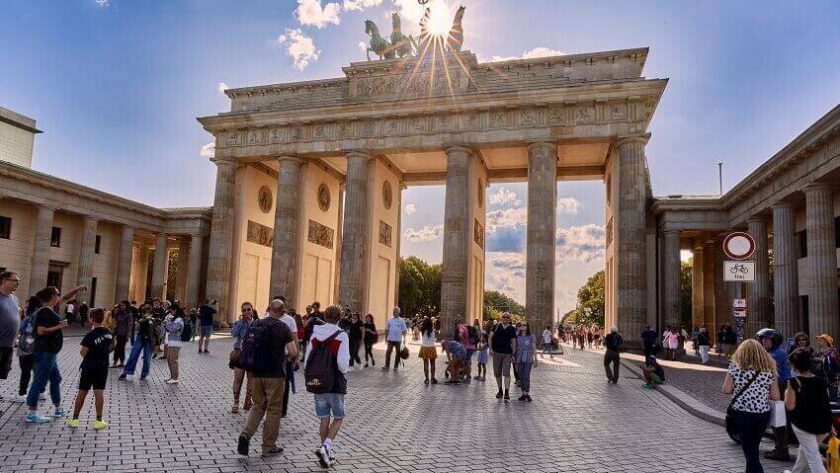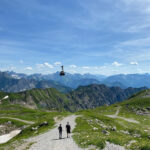English, a language that has connected the world. If English was not so well understood in different parts of the world, how would we ever manage our travels?
Granted, we can make do with English. However, sometimes we do wish we had known the local language, so we could get more involved. At times, English alone is insufficient.
We are grateful that most European countries have accepted the English language to help the travelers and make their journeys smooth. So, what prevents us from learning and expressing gratitude in the local language of the country we visit?
If we’re on the same boat, let’s learn some essential German phrases for travelers to practice and use during your visit to Germany.
Basic phrases
Hallo (haalo) – Hello
Guten Tag (goo-ten tahk) – Good day
Used as a greeting.
Guten Morgen (goo-ten mohr-ghen) – Good morning
Guten Abend (goo-ten ah-bent) – Good evening
Wie geht es Ihnen? (vee geyt es ee-nen) – How are you?
Tschüss (choos) – Bye
Ja / Nein (ya / nine) – Yes / No
Auf Wiedersehen (ouf-vee-der-zey-en) – Goodbye
Entschuldigung (ent-shool-dee-goong) – Excuse me
Bitte – Please / You’re welcome
Introducing yourself
Ich bin Leonardo (ikh bin Leonardo) – I am Leonardo
Ich komme aus Spanien (ikh kom-me ows shpa-nee-en) – I come from Spain
Ich bin Ingenieur (ikh bin in-ge-nyoor) – I am an engineer
Knowing the directions
Wo ist die Toilette? (vo ist dee toy-let-teh?) – Where is the toilet?
Links (links) – Left
Rechts (rekhts) – Right
Geradeaus (ge-rah-de-ows) – Straight ahead
In the restaurant
Ich nehme einen Burger (ikh neh-me ay-nen boor-ger) – I’ll have a Burger
Haben Sie Pizza? (haa-ben zee peet-sah?) – Do you have Pizza?
Rechnung, bitte (rekh-noong, bit-teh) – Bill, please
Zusammen (tsoo-zah-men) – Together
Mit Karte oder Bargeld? (mit kar-teh oh-der bar-gelt?) – With card or cash?
Mit Karte, bitte (mit kar-teh, bit-teh) – With card, please
Noch ein Bier, bitte (nohk ayn beer, bit-teh) – Another beer, please
Prost! (prohst!) – Cheers!
Other German phrases
Ich brauche Hilfe (ikh brow-khe hil-feh) – I need help
Ich bin verloren (ikh bin fer-loh-ren) – I am lost
Meine Handtasche ist weg (mi-ne han-tash-e ist veyg) – My purse is lost
Ich muss zum Bahnhof gehen (ikh moos tsoom bahn-hof ge-yen) – I need to go to the train station
Wie viel kostet das? (vee feel kos-tet das?) — How much does that cost?
Ich kann nicht Deutsch sprechen (ikh kan nikht doytsh shpre-khen) – I cannot speak German
Sprechen Sie Englisch? (shpre-khen zee eng-lish?) – Do you speak English?
Reisepass (rai-ze-pass) – Passport
Basic numbers
If you ever need to use numbers, it’s helpful to review and memorize the first 10 digits.
null (noohl) – 0,
eins (ayns) – 1,
zwei (tsvy) – 2,
drei (dry) – 3,
vier (feer) – 4,
fünf (fümf) – 5,
sechs (zeks) – 6,
sieben (zee-ben) – 7,
acht (ahkt) – 8,
neun (noyn) – 9,
zehn (tsehn) – 10
It can be especially be useful when you’re providing your phone number to someone.
Meine Handynummer ist null eins fünf acht sieben vier acht drei sieben vier – My mobile number is 0158748374
Communication tip
It can certainly be overwhelming, and you might find yourself using just “Dankeschön” and “Bitte” throughout your journey, but it’s still worthwhile to learn these basic phrases and try to use them whenever you can.
When you need to communicate in German, it’s best to be concise and direct. Rely on your vocabulary to convey your message. For instance, instead of struggling to form a complete sentence, just say “ein Kappuccino, bitte?”. Although not perfect, it helps when you’re traveling in a foreign country and manage to navigate using just brief phrases like this. I have exhausted my limited German knowledge many times to get through different scenarios. And you’re in luck, because Germans are helpful people.
Well then, ‘Viel Spaß’ (fee-l shpaas) – Have fun!



